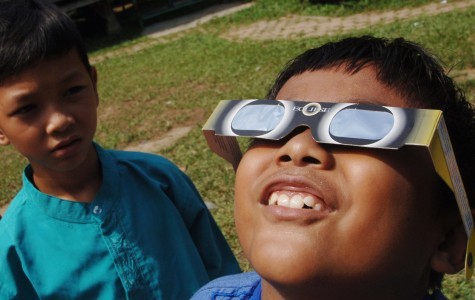Popular Reads
Top Results
Can't find what you're looking for?
View all search resultsPopular Reads
Top Results
Can't find what you're looking for?
View all search resultsNASA, LAPAN to test out new camera on solar eclipse in Indonesia
Scientists from the US and from an Indonesia-based space institute will conduct a joint observation of the solar eclipse in North Maluku, in eastern Indonesia, on March 9 using a new polarized camera.
Change text size
Gift Premium Articles
to Anyone
S
cientists from the US and from an Indonesia-based space institute will conduct a joint observation of the solar eclipse in North Maluku, in eastern Indonesia, on March 9 using a new polarized camera for scientific research.
The scientists from NASA in the US and Indonesia's National Institute of Aeronautics and Space (LAPAN) will be teaming up deputy chief of mission at the US Embassy to Indonesia Brian McFeeters said.
"The scientists will go together to observe the eclipse with a special camera that NASA has developed," he told reporters during an event at the American cultural center @america on Friday to introduce the American astrophysicists who have recently arrived in Indonesia.
They will test out the new technology in Maba, Halmahera, in North Maluku to observe the eclipse and get the best scientific data possible, McFeeters said.
Astrophysicist Nat Gopalswamy said he will lead a team of four people from NASA and will stay in the country for one week, until March 12, to closely cooperate with the team from LAPAN.
"LAPAN is interested in studying different aspects of the corona and ultimately, we will combine all the observations," said Gopalswamy.
Nelson Reginald from NASA said they had brought a special tool called a polarization camera that they would be using for the first time.
"We will know what we get out of the camera after the eclipse," Reginald said.
Meanwhile, LAPAN researcher Emanuel S. Mumpuni said they had chosen Maba due to its eastern location in the hope of finding the best angles from which to view the eclipse and also a more accommodating climate to ensure the best results.
The eclipse is expected to happen at 9:50 a.m. local time and could last for 3 minutes, he added, during which time the most important research would take place.
Observation results will be presented at an international symposium in Bandung in June 2016.
Indonesia is the only country whose lands will witness the solar eclipse. Parts of the country will experience a total solar eclipse on March 9, for the first time since 1995. The next total solar eclipse to hit Indonesia will be in 2023.
The rare event will be progressively visible in 11 provinces: Bengkulu, Jambi, South Sumatra, Bangka Belitung, West Kalimantan, South Kalimantan, Central Kalimantan, East Kalimantan, West Sulawesi, Central Sulawesi and North Maluku. (rin)











